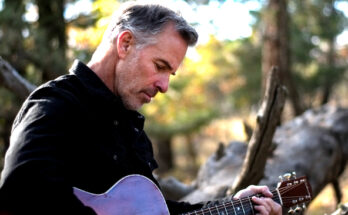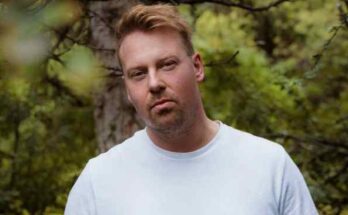Interview by Alitzia Tyminski / Photos Natalie Mason – Since unleashing their seminal 1996 debut ‘Die for the Government’, Anti-Flag has empowered and emboldened the listeners of two generations beset with a new millennium stricken by war, pandemic, racial upheaval, and financial collapse. The Pittsburgh, PA quartet—Justin Sane [vocals], Chris#2 [bass, vocals], Chris Head [guitar, vocals], and Pat Thetic [drums]—has consistently embodied a timeless punk spirit over the course of 25+ years.
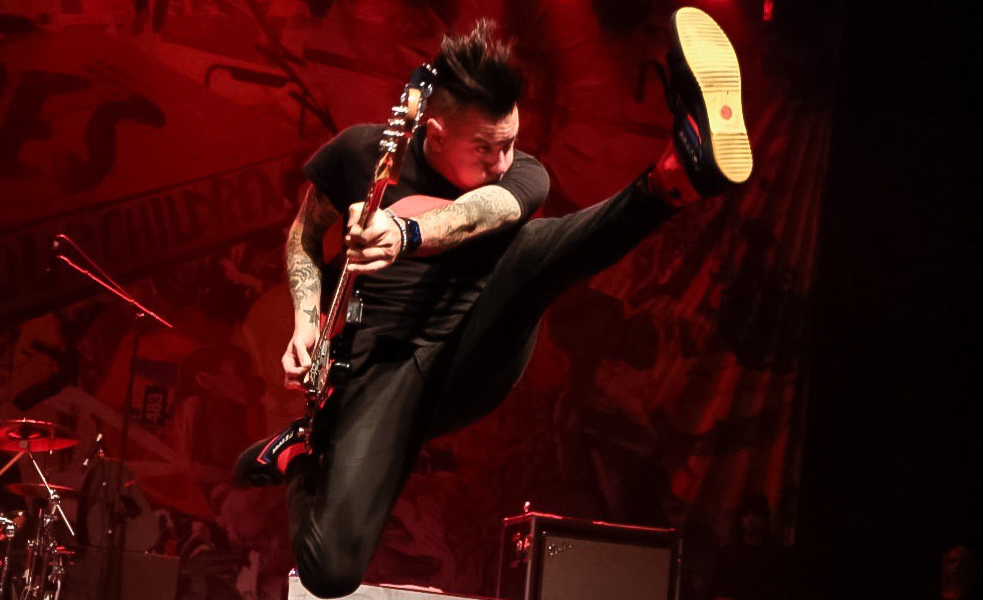
Congratulations on the album Lies They Tell Our Children, being the first concept album, what made Anti-Flag decide to go in that direction?
That’s a great question, I think first and foremost what we have deciphered or learned from the perspective of age and from being in a band for as long as we have been is generally when we’re the most successful at creating art and I don’t necessarily mean success in the monetary sense or success in that we sold more concert tickets or t-shirts or whatever but success in terms of the album and the art of connecting with people.
The times that we’re most successful is when we’re true to ourselves, when we push ourselves from our comfort zone, when we attempt to be a better version of ourselves and really put the hours in and the work in.
Unfortunately when you’re a band for a very long time I think what happens is you start to create for creation’s sake, you start to believe that there’s an audience that wants something from you, so you have to make something or you know whether it’s touring, festivals or just your own shows, the promoters will say like well if you had a new release then we would be way more excited on putting you on the show or you know if you had a new album this band might take you on tour, so you just start creating because you think that’s the tool you need to access people.
And often that doesn’t lead to the most inspirational art and so with all of that knowledge going into the 13th album of the band, we really were like well what can we do that’s different, something that we’ve never done before, something that maybe people wouldn’t expect from us in hopes that we create something compelling and something worth talking about for a band that’s been around as long as we have.
That’s kind of like the impetus of the idea. Then we started kind of kicking around what the concept could be, it very quickly developed for us, where we would pick a number of issues. I think we ended up with 10 of them on the album and then we would draw those lines and trace back those issues to their origins and that’s loosely the concept of the album.
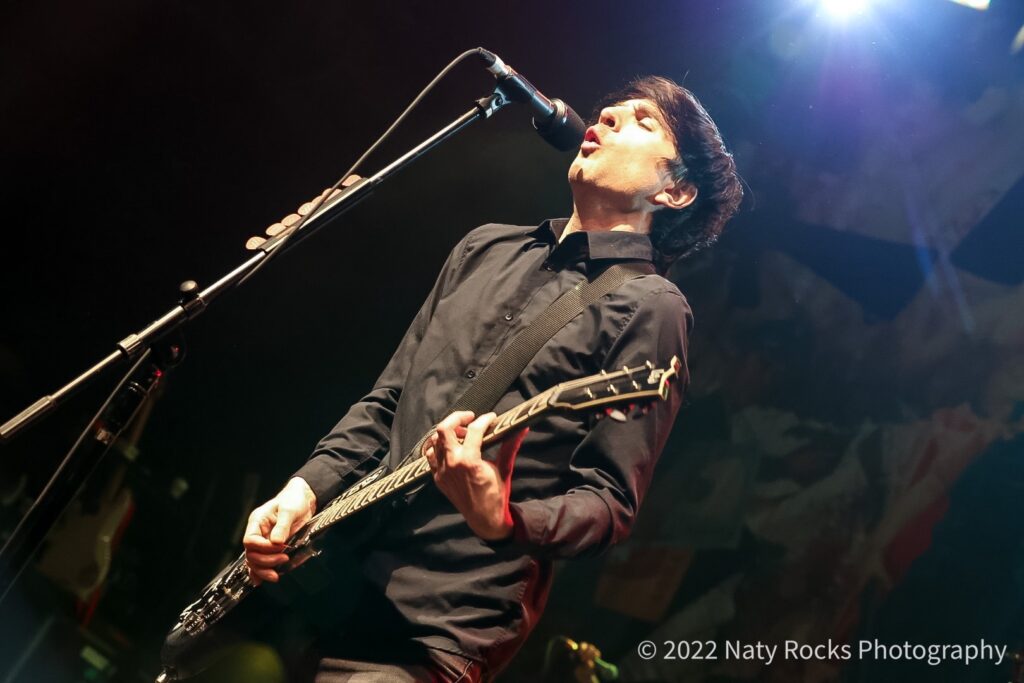
You know when you talk about the climate crisis or you talk about a morally bankrupt for profit healthcare system or you talk about the nefarious history of redlining in America, the United States or the violent history of Americas in its origin; all of those were threads we felt were worth pulling on because a lot of them aren’t just old or as powerful or as ingrained in our lives as one might think.
We thought it was really empowering for people to know. When you’re at your holiday dinner with your uncle who says that climate change isn’t real and you get really angry at them and you’re trying to fight with them, that disinformation campaigned to confuse people on the issue of climate change only happened in the 70s, it’s not that old, we know many people that are older than that idea that fossil fuels are bad for the planet or not bad for the planet whatever side of the argument you fall on.
But you should know that if you fall in the counter-argument it’s because ExxonMobil and BP etc. etc. took out millions and billions of dollars in ad campaigns to confuse you.
It seemed like I said really empowering to kind of trace those ideas and those problems back to their origins.
Sometimes those origins are cyclical and they keep repeating itself as well.
There are moments where people would say wow Anti-Flag, how is it so timely and it’s like well because this shit keeps happening over and over again, you kind of start to see the patterns everywhere you look. Especially with things like Charlottesville and the uprising of right-wing culture in America, those things are certainly cyclical in nature and one you can definitely set your watch to, it happened like clockwork.
Doug Dean is an artist based in Pittsburgh. He stated he literally used his own blood to create the album cover for Lies They Our Children. What inspired Anti-Flag to collaborate with Doug Dean for this album?
Doug’s been our main artistic collaborator since 2015, he is someone that we have been aware of since he was in college. As a designer he created things for us in 2004 as part of school projects, just like someone who has been around our world for a really long time.
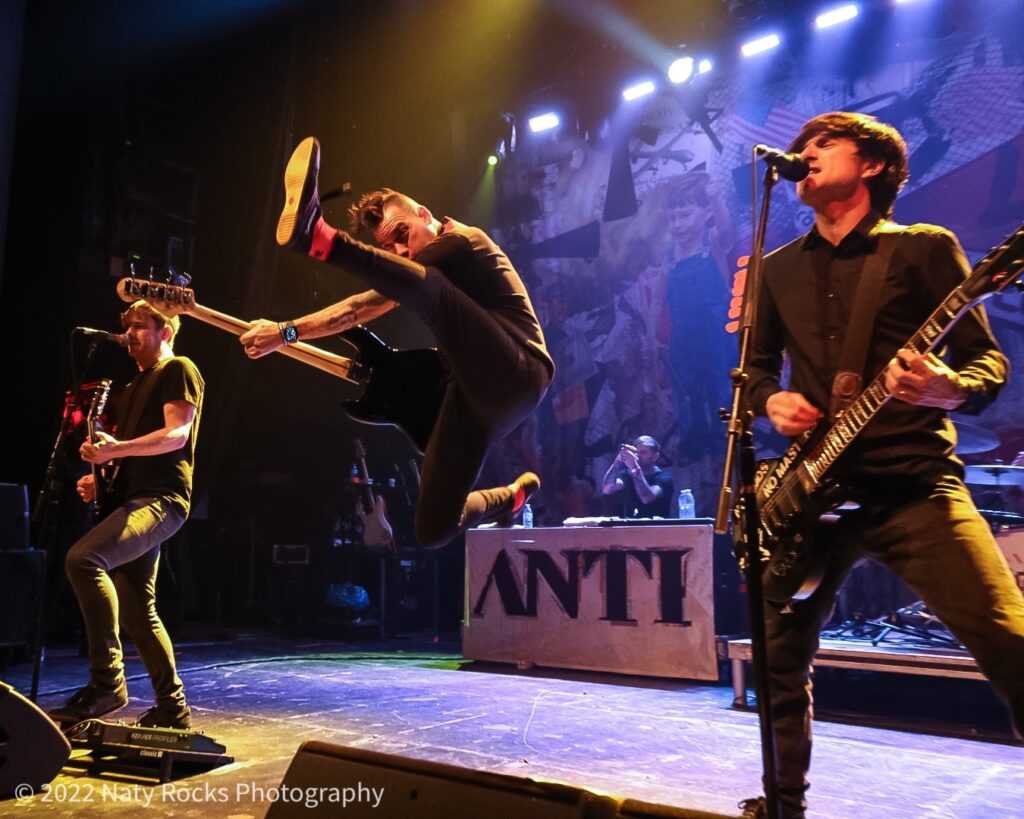
When we started this kind of newest chapter of the band, we knew that we wanted to have it be really fully embracing the aesthetics and almost the aura of the culture of punk rock that we love, you know whether it’s The Clash or the Dead Kennedys and so much of that was about having a visual artist encampment with the musical artists and what we decided who do we know in Pittsburgh someone that is in our fold we can snibbly see and meet and interact with and so Doug was really on top of that list.
Doug just delivered on such a high level when it came to all of the really small but important details to American Spring that it was only fitting that he did American Fall, 20/20 Visions and now Lies They Tell Our Children.
He keeps upping his game, when we came up with the concept, we knew we were going to do 11 individual pieces of art for the 11 songs and then those would kind of collage or transform into the album artwork itself.
And then obviously you know his wife is a nurse so she was able to take vials of his own blood that he was able to use to draw certain text elements of the album, his kid had their teeth pulled (I am actually looking at the artwork, it’s over to my left), his child’s teeth are in the album artwork, there’s a bunch of wild stuff in there. (Laughs)
I think that when you are as committed to the ideology as so many of our heroes have been, we just want to pay homage to that, to that commitment to it so I think that Doug is doing the same thing with the visual side as we are with the musical side.
INDECLINE is an activist art collective comprised of artists and activists that directed music videos for eight songs on the current album. How did that collaboration originate?
INDECLINE did a video for us off of 20/20 Vision that was one of my favourite videos that we ever done for the song 20/20 Vision and we had two concepts for that song that we really liked and I pitched them both to INDECLINE and they just took that little thread of idea and turned into something so beautiful and so moving that we knew again that we had found these people that got it, that understood the voice and the intention of Anti-Flag.
We have this funny saying and Pat our drummer says it all the time, “Never Be Too Good At A Job You Don’t Want'” meaning that if you’re around us and you’re skilled at something we’re going to take you for as long as you want to be apart of it.
If you don’t like what you’re doing you better not do it well because Anti-Flag will keep you in our crew or in our world for 20, 30 years. (Laughs)
INDECLINE did that well, they did one music video well and we then came to them with the concept of making eight. (Laughs)
So that just goes to show you, you give an inch, we want all of it!
Modern Meta Medicine featuring Jesse Leach of Killswitch Engage addresses the healthcare system from the opiod crisis to the denial of access to healthcare for the low-income population in the US.
Would you say the song is also relevant and representative of healthcare globally especially in the last couple of years with the pandemic?
I think that the vaccine apartheid was a great example of that where you saw only wealthy affluent people have access to that medicine and people who are of poor and subjugated cultures were ignored.
I think it ties in with that but it also ties in with and it treads another line which is sometimes uncomfortable especially for people who consider themselves to be leftist or of an ideology that is empathetical, we are too quick to dismiss and to erase or cut people who were maybe confused or maybe misinformed out of our lives.
We saw a lot of this with the vaccine hesitancy, we see a ton in America.
Whenever a Southern state will vote to re-elect Republican leaders who have been bad for the state and then that state gets hit with a hurricane or something and then people on social media are like, “Good they didn’t vote the way I wanted to.” And to me that’s such a fucked up cynical way to look at the world.
I understand why people were hesitant or fearful of Pfizer. Pfizer is a nefarious evil company and so it makes sense to me that people would be scared of a mandated version of something that Pfizer is going to make gazillion of dollars from.
Black people in the United States have been subjugated and oppressed and experimented on by a medical system here throughout the history of the United States, having poor and black communities be vaccine hesitant in 2020, 2021, 2022, I understood it.
So I think with that song we were trying to say look if you want egalitarian healthcare systems, you have to dismantle all of it, you have to get rid of these massive corporations who make so much fucking money off of the suffering of people and ultimately their goal wasn’t to cure things, it’s to continue to make profit and that’s fucked up.
We’re from Pittsburgh, Pennsylvania, Jonas Salk the creator of the Polio vaccine, he was from Pittsburgh.
When he was asked whether or not he should patent the Polio vaccine, his response was, “Can you patent the sun” meaning can you patent the thing that everyone needs to live.
It’s frustrating to me you see it now they’re passing laws in American legislation that allows Pfizer to sell the vaccine which was paid for by the taxpayer dollars and global commitment to creating a vaccine for COVID-19 but it only cost $2 to manufacture they want to sell it for $130 a dose.
I mean it’s morally bankrupt. It is by design they want us arguing with each other over whether or not the vaccine is good or bad, they want us arguing about whether the planet is really dying or it’s not because then they can just continue to operate how they’re operating and make a lot of fucking money doing it.
It’s one of the overarching ideas and messages within the album to challenge that system of economic inequality that we have, challenge capitalism as a whole.
But it’s also a thing that we’re trying to talk about in there is that our empathy for one another, it has to increase.
People talk about the sustainability of the planet, the sustainability of humanity, the trajectory that we’re on where we’re treating the most vulnerable elements of our society whether it’s LGBTQ+ youth, whether it’s immigrants, refugees, whether it’s the poor, we’re treating the most vulnerable sects of society with the least amount of dignity right now and that is unsustainable and that needs to change.
Hopefully that’s the challenge and the message of the album that makes its way through.
It’s important to have those conversations that you mentioned, especially where the music industry has been silent on that topic.
Anti-Flag has been a band for a very long time and we existed before social media, we’re not afraid of it. I understand a lot of new bands, a lot of new people don’t like it, they take it really to heart when someone comments negatively on their Facebook post or their Instagram post or whatever.
That shit never bothered us because we know it’s not real, the reality of our band’s life is when we play the show, we connect with people, we look them in the eye, we share these ideas and we find our commonality and we accept one another for who we are as flawed as we may be and that value for us is so much higher than the Spotify stats or the followers you have on the internet.
We’re able to tune a lot of that shit out. When you say that a lot of the music industry is silent on these things, I understand it. I mean it’s scary, it hurts your feelings so I get why people are hesitant to make challenging statements but also this is the art that I love and I make it because I love it not because I hope that people will accept it, that part is out of my control, once it’s made it’s made and it’s no longer ours it just goes out into the ether.
I do love the fact that our band, the four individuals of the band we would be playing these songs, writing these songs and playing these shows with or without an audience, we did it long before anybody cared, we’ll probably do it long after they stop caring. (Laughs)
Fans want to be able to hear from their leaders and heroes, I think a lot of people ask those questions because they want to know what they think.
I think too for us the show exists to break down the barriers, that separation amongst people, and so if there is any moment we can have somebody look around and say okay well in this room there are other likeminded people that feel the same way I do but also on the stage there is and there’s no reason why I can’t be on that stage, that’s just as valuable as anything that we do as a band.
Anti-Flag inspired fans to pursue careers in law to social work to effect change and fight the injustices of the world, do you have any stories to share where Anti-Flag changed someone’s life?
Somehow we have so many, it is our great success as a band to know that the art, punk rock, whatever you want to call it interacted with somebody on such an emotional level that they changed the course of their lives.
We were just recently at a show in Wisconsin and we had a person come up to us and show us this business card, it was a really beautiful embossed card where they were a Judge in their local community.
What they saw was that it was mostly right-wing Conservative folks who were getting those positions of power and so they went to law school, they did the things that they needed to do and they saw it as an act of resistance to run for Judge and be elected and serve with an empathetical tinge that they learned in the community of punk rock.
They attested that to a show of Anti-Flag that they saw in 2003 I believe and it changed their lives, they went on to do this. For us that little business card, that’s the Platinum album, that’s the plaque that you hang.
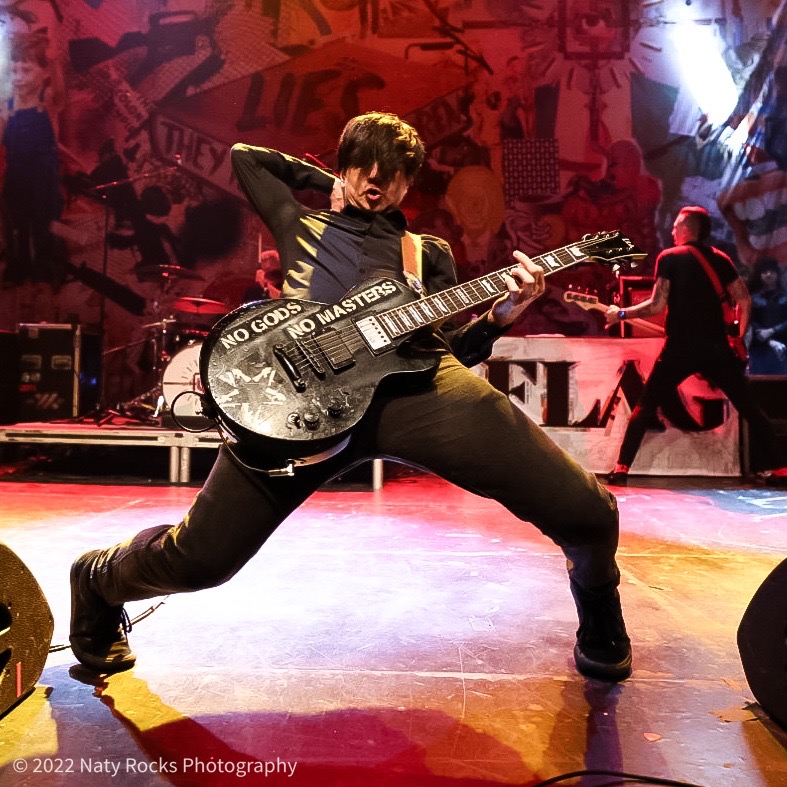
We have a conscientious objector letter from a person who was serving in Iraq, they didn’t believe that the war was justified and they used some tools that Anti-Flag had on our website at the time to register and fill out the forms to apply for conscientious objection, meaning that they didn’t believe that the war was just or moral in their eyes and they were discharged from the military and successfully able to apply for that conscientious objector status. Then they sent the letter to us and we framed it.
Those are the things that allow us to feel as if the backbone intention of the band is true, meaning that perhaps we were naïve in the beginning we thought that if we wrote a song on a Tuesday that racism would be gone on Wednesday but the world doesn’t work like that.
You play the song, you interact with people, that in turn somehow affects them, affects yourself, you go out with these new set of politics, you live it on a daily basis whether it’s at school or at work or the dinner table with your parents whatever it may be and then you affect those people by living in a certain way that they see and they want to live as well.
And then before you know it, all of these fires have gone out into the world of people who are treating those that need it desperately with kindness, dignity and humanity.
That little revolutionary act of being kind in 2023, I think goes even further now especially with the heightened intention, division and separation and inequity that we see, anything we can do to combat the racism, sexism, homophobia, transphobia, Islamaphobia, xenophobia and all these bigotries that exist, that’s the value to us, that’s the goal, that’s the win.
You completed Level 1 of Kung Fu certification. What inspired you to study Kung Fu and how did Kung Fu impact your life?
I study virtually, it’s a really incredible instructor that I have, it’s KungFu.Life and they have been incredible, they have so much energy and optimism and just really in line with the type of positivity that I really needed during the pandemic.
I started just virtually taking the lessons then, mostly to stay physically active when you weren’t able to do anything. I usually play ice hockey and do other shit like that to kind of clear my head, keep my body moving while the band was not on tour, we were unable to do any of that during the pandemic.
I found this person Shifu Yan Xin who is incredible, found him on YouTube and started taking the classes there and eventually signed up and got really committed to it.
I had an injury at the beginning of last year that I have been nursing but now my body is kind of back in shape where I can kind of get back into it again.
I think for so many of us the pandemic was this ghost that followed us around and made it so that we felt less like ourselves and more inclined to allow the worst parts of our personality to overtake us.
I needed some direction and that’s really where it came from and why I started doing it.
As a hockey enthusiast, do you have a favourite Canadian hockey team?
Oh Canadian hockey team, probably the Edmonton Oilers, mostly because we did a cross Canadian tour with Billy Talent in 2007 that played all of the hockey arenas.
When we got to Edmonton, they were the coolest to us, they had jerseys for us, the Equipment Manager sharpened mine and John from Billy Talent’s skates, so we had all of this really cool nice connections with the Edmonton Oilers.
No offense to the other great Canadian hockey teams out there but they were the coolest to us.
What was it like working with Ashrita Kumar of Pinkshift to create the track Imperialism?
Ashrita is incredible and it seems like you’re familiar with Pinkshift and hopefully a big as a fan as I am, I think they are incredibly important and a great testament to what punk rock is and has become.
I think that so many young people that are creating this genre of music right now are doing it for the right reasons, there’s no disillusionment of becoming famous or it’s not as viable as it maybe was in the early 2000s where you saw Good Charlotte and Yellowcard, New Found Glory etc. on MTV, you had a lot of music that was created with the intention of becoming famous.
That’s not a great place to create art from. To see a band like Pinkshift come out of just wanting to do it because they were such a fan of the music and the intention and then their politics are lived as three people of colour in the scene, their existence is a bit of a resistance and is a really powerful thing.
When we were writing that song, we had got to the bridge and a really beautifully sung melody that Justin had written, we were kind of thinking who could we get for that and we had some people in mind but really ultimately Pinkshift for us was more about kind of paying respect to the new school.
What their trajectory is limitless, I think that they can be as big as any punk rock band ever but also I think that they are fulfilled just in playing the show, connecting with people and meeting people, I think that is the most beautiful aspect of it, it’s not formed around a different intention.
The song itself changed shape with her voice, she added a different perspective and a different element to it that I think changed and challenged the politics of the song as a whole.
That’s a really cool and beautiful example of how incorporating different voices in your global view and your perspective can help, alter and change the lenses that you’re looking at the world through.
What can fans expect with your upcoming tour with Flogging Molly & Skinny Lister next month?
Honestly, we’re excited to get after it, to play new songs, to see so many friends again, we haven’t seen Skinny Lister I think since 2012 or 2013 on a Warped Tour.
Flogging Molly we saw last summer but it was very briefly, really excited to get on the road with them. One of their first tours of America, we took them out in 1999 so 24 years later to be back at it again is wild. (Laughs)
More than anything this tour is going to a lot of cities that even in the US we never been to, like to play Bethlehem, Pennsylvania is wild to us, Nashville, Tennessee, a lot of really cool interesting parts of the US that often get forgotten because it’s a big world and we’ve gotta play all the major cities of it and you tend to skip a lot of places because of that.
I think that’s the part I am mostly looking forward to just getting to some new places.
Anytime a band has been together for 30 years can play in a city they never played in before is an awesome feat so we’re grateful for the opportunity and we’re going to do our best to let people know that there’s a band that feels that the world can be better than we found it and we’re going to do everything in our power to leave it that way.
